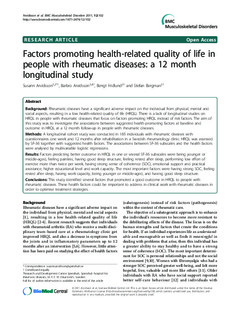| dc.contributor.author | Arvidsson, Susann | |
| dc.contributor.author | Arvidsson, Barbro | |
| dc.contributor.author | Fridlund, Bengt | |
| dc.contributor.author | Bergman, Stefan | |
| dc.date.accessioned | 2019-10-11T11:26:17Z | |
| dc.date.available | 2019-10-11T11:26:17Z | |
| dc.date.created | 2011-11-03T09:21:12Z | |
| dc.date.issued | 2011 | |
| dc.identifier.citation | BMC Musculoskeletal Disorders. 2011, 12 . | nb_NO |
| dc.identifier.issn | 1471-2474 | |
| dc.identifier.uri | http://hdl.handle.net/11250/2621597 | |
| dc.description.abstract | Background Rheumatic diseases have a significant adverse impact on the individual from physical, mental and social aspects, resulting in a low health-related quality of life (HRQL). There is a lack of longitudinal studies on HRQL in people with rheumatic diseases that focus on factors promoting HRQL instead of risk factors. The aim of this study was to investigate the associations between suggested health promoting factors at baseline and outcome in HRQL at a 12 month follow-up in people with rheumatic diseases. Methods A longitudinal cohort study was conducted in 185 individuals with rheumatic diseases with questionnaires one week and 12 months after rehabilitation in a Swedish rheumatology clinic. HRQL was assessed by SF-36 together with suggested health factors. The associations between SF-36 subscales and the health factors were analysed by multivariable logistic regressions. Results Factors predicting better outcome in HRQL in one or several SF-36 subscales were being younger or middle-aged, feeling painless, having good sleep structure, feeling rested after sleep, performing low effort of exercise more than twice per week, having strong sense of coherence (SOC), emotional support and practical assistance, higher educational level and work capacity. The most important factors were having strong SOC, feeling rested after sleep, having work capacity, being younger or middle-aged, and having good sleep structure. Conclusions This study identified several factors that promoted a good outcome in HRQL to people with rheumatic diseases. These health factors could be important to address in clinical work with rheumatic diseases in order to optimise treatment strategies. | nb_NO |
| dc.language.iso | eng | nb_NO |
| dc.publisher | BMC (part of Springer Nature) | nb_NO |
| dc.rights | Navngivelse 4.0 Internasjonal | * |
| dc.rights.uri | http://creativecommons.org/licenses/by/4.0/deed.no | * |
| dc.title | Factors promoting health-related quality of life in people with rheumatic diseases: a 12 month longitudinal study | nb_NO |
| dc.type | Journal article | nb_NO |
| dc.type | Peer reviewed | nb_NO |
| dc.description.version | publishedVersion | nb_NO |
| dc.source.pagenumber | 13 | nb_NO |
| dc.source.volume | 12 | nb_NO |
| dc.source.journal | BMC Musculoskeletal Disorders | nb_NO |
| dc.identifier.doi | 10.1186/1471-2474-12-102 | |
| dc.identifier.cristin | 850049 | |
| dc.description.localcode | © 2011 Arvidsson et al; licensee BioMed Central Ltd. This is an Open Access article distributed under the terms of the Creative Commons Attribution License (http://creativecommons.org/licenses/by/2.0), which permits unrestricted use, distribution, and reproduction in any medium, provided the original work is properly cited. | nb_NO |
| cristin.unitcode | 194,65,70,0 | |
| cristin.unitname | Institutt for helsevitenskap Gjøvik | |
| cristin.ispublished | true | |
| cristin.fulltext | original | |
| cristin.qualitycode | 1 | |

